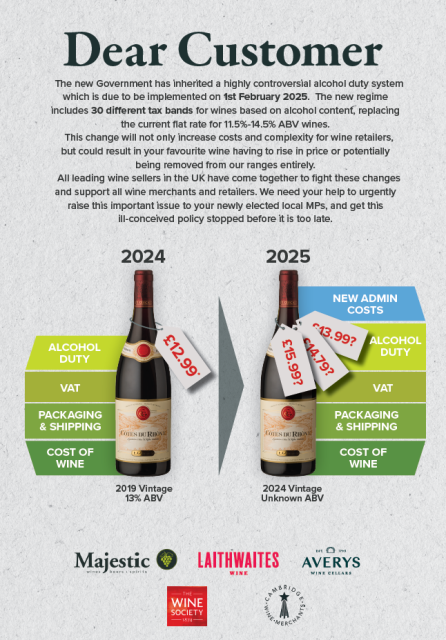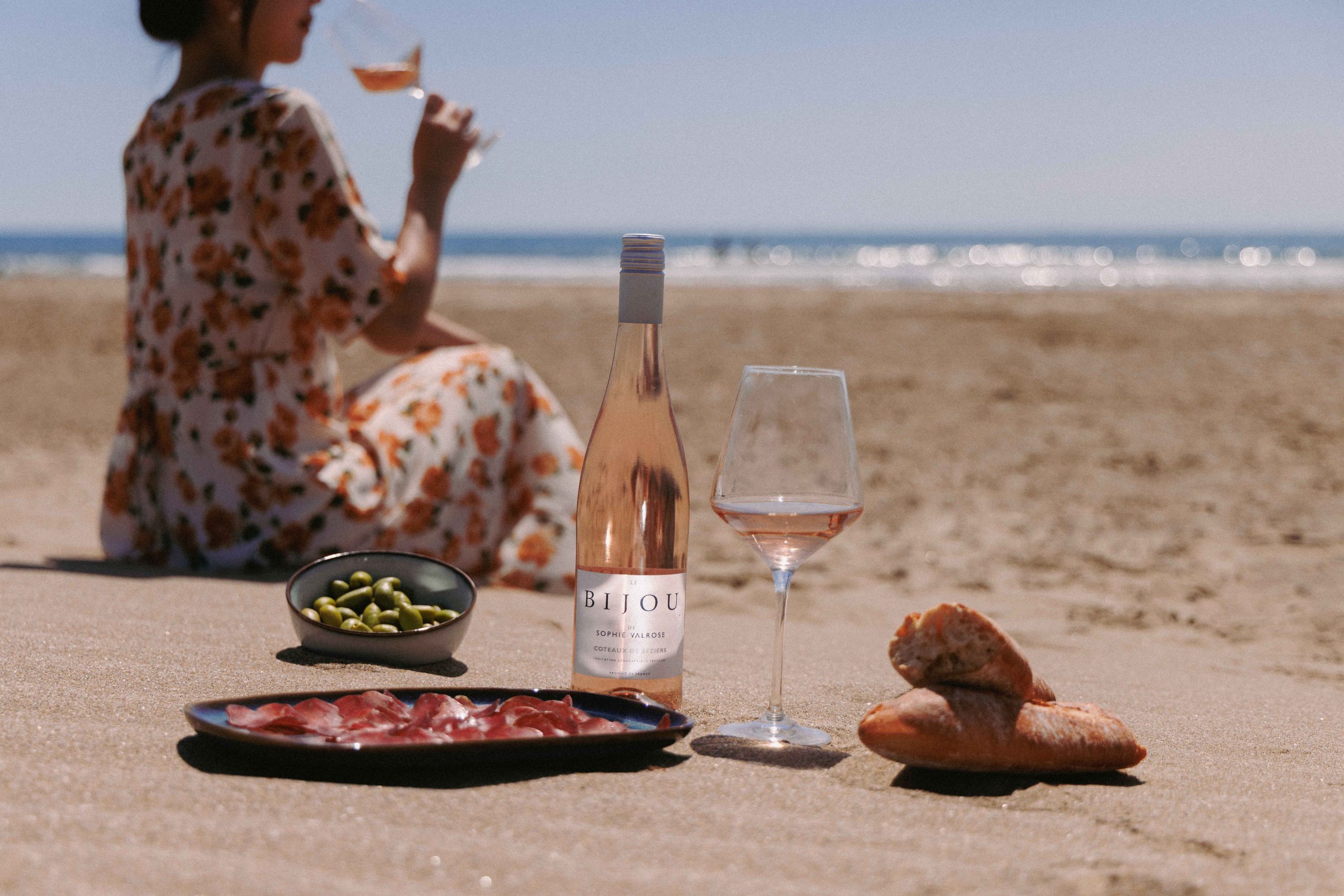db exclusive: “duty will cost us £3.5 million next year,” says The Wine Society CEO Steve Finlan
By James BayleyThe Wine Society, a historic mutual organisation serving over 180,000 members, faces a significant financial challenge in 2025 due to rising costs, with alcohol duty playing a central role.

CEO Steve Finlan has exclusively revealed the stark impact of new duty rates to db, which will add an estimated £3 to £3.5 million to the Society’s costs next year, alongside a slew of other financial pressures.
“Duty as a whole will cost us in the region of £3 to £3.5 million next year,” Finlan said. This increase follows a 20% duty rise in 2023, a burden The Wine Society absorbed without passing on the cost to its members. However, Finlan warned that holding the line indefinitely is unsustainable. “A combination of those two means that we will have to put some prices up as we go into next year. However, we are still planning—and we’ve not finalised the plans yet—but we’re planning to hold a whole bunch of prices and keep any rise to an absolute minimum. That means that for us as a business, we can do this because we’re a mutual.”
The upcoming duty increase is not an isolated financial strain for The Wine Society. Other escalating costs include £1.3 million linked to the government’s Extended Producer Responsibility scheme, which places additional demands on packaging producers. The organisation also faces a £400,000 increase in National Insurance contributions and a further £400,000 in rate rises as tapering relief ends. Additionally, the Society has committed to a staff pay review at an added cost of £400,000. Together, these factors represent a £5 to £5.5 million increase in costs for a business that expects to make £2 million in profit this year.
“If we just do nothing, we’re going to have a £3.5 million hole,” Finlan said of the challenge ahead. He is frank about the wider implications for the industry, particularly for smaller businesses. “We’ll manage it because we’re big enough and we’re a mutual, as I say, so we can make choices that are easier. But when you get down to… I don’t know how on earth [small independents] are going to see their way through.”
Despite the challenges, Finlan is committed to The Wine Society’s core purpose: delivering value to its members. “For clarity,” he explains, “we’ll lower some prices, we’ll hold a lot of other prices, but we’ll have to put some prices up. But we’re not looking to just say, right, we’re going to have to pass this duty on. We’re working really hard to minimise the impact of that.”
Another area of contention with the duty changes is that lower-alcohol wines will attract reduced rates. The Wine Society already offers a broad range of wines at 13% ABV or below—around 900 out of its 2,100 wines. Finlan notes, “Where duty comes down, we’ll see some prices come down. … We will aim to pass those prices on to members.”
However, higher-alcohol wines, which represent approximately 55% of the Society’s range, will attract higher duty. Finlan stressed that member preferences, rather than government policy, will drive the range’s future shape. “We’re not going to actively change our range shape,” he insists. “I’d much rather be consumer-led on wine choices that members make, rather than government-led on choices that consumers make.”
The new duty regime: a “kick in the teeth”
The government’s decision to raise alcohol duty in line with the Retail Price Index (RPI) was described as “a real kick in the teeth” by the wine and spirit sector when it was announced in October’s Autumn Budget. This comes after last year’s record-breaking duty hikes—the largest in nearly 50 years—which increased tax rates by 20% for nine out of ten alcoholic beverages and 10% for average-strength spirits.
The Wine and Spirit Trade Association (WSTA) has long argued that raising taxes on alcohol is counterproductive, pointing to recent HMRC data showing a £500 million drop in alcohol duty receipts in the first six months of the financial year. “Duty increases lead to price rises for consumers, a dip in sales, and, as a result, fewer receipts for the Treasury,” notes the WSTA.
Partner Content
Adding to the complexity, from February 1, 2024, wine will be taxed on a sliding scale based on its alcoholic strength. The current flat rate of £2.67 for wines between 11.5% and 14.5% ABV will be replaced by up to 30 different rates. For example, a bottle of wine at 14.5% ABV will see its duty rise from £2.67 to £3.09. This change creates new administrative burdens for wine businesses, which already operate within strict production rules that limit their ability to adjust alcohol levels.

The WSTA and industry leaders have campaigned to retain the temporary easement that simplified wine taxation. However, chancellor Rachel Reeves has decided to end the easement, a move described by many in the industry as “complex, costly and unnecessary.”
Finlan is sharply critical of the government’s approach to alcohol duty and other regulatory changes, accusing policymakers of “an extraordinary lack of joined-up thinking.”
The Wine Society has already implemented a recruitment freeze and is re-evaluating its investment profile. Finlan warns that such measures are likely to inhibit growth and hurt the Treasury’s long-term revenue. “It will inhibit growth and it will cost the Treasury a load of money.”
Another pressing concern is the implementation of Extended Producer Responsibility, which Finlan describes as a “badly thought-through policy.” He explains, “The guidance that we’ve got at the moment has led me to say it’s going to cost us £1.3 million. But the most extraordinary thing is that DEFRA has said to us, ‘We’ve given you this guidance, but don’t use it for planning or budgeting purposes because it might change.’”
Such uncertainty complicates planning for businesses already navigating a volatile economic environment. “We have to use something. So we have to use your guidance, and for us, that’s £1.3 million in additional costs, three times the level of the National Insurance hit that we’ll take,” Finlan said.
The trade’s role in advocacy
Despite the challenges, Finlan remains hopeful about the power of collective action within the drinks trade. “We keep on lobbying. We’ve got a very good, active retail group under the auspices of the WSTA. We’ve spoken two or three times in the last month about these very issues,” he said. However, he is realistic about the limits of advocacy in the short term. “In the immediate term, I can’t see any going back on what’s in the budget.”
For The Wine Society and the wider drinks trade, the coming year will be a test of resilience and adaptability. As Finlan put it, “We’ll manage it because we’re big enough and we’re a mutual. But this is beyond the worst case… it’s just bad news.”
Related news
The winemaking nations hit hardest by Trump tariffs
Hospices de Nuits-Saint-Georges auction: bucking the trend
‘Liberation Day’ or liquor lockdown? Trump’s tariffs rattle the wine & spirits world




